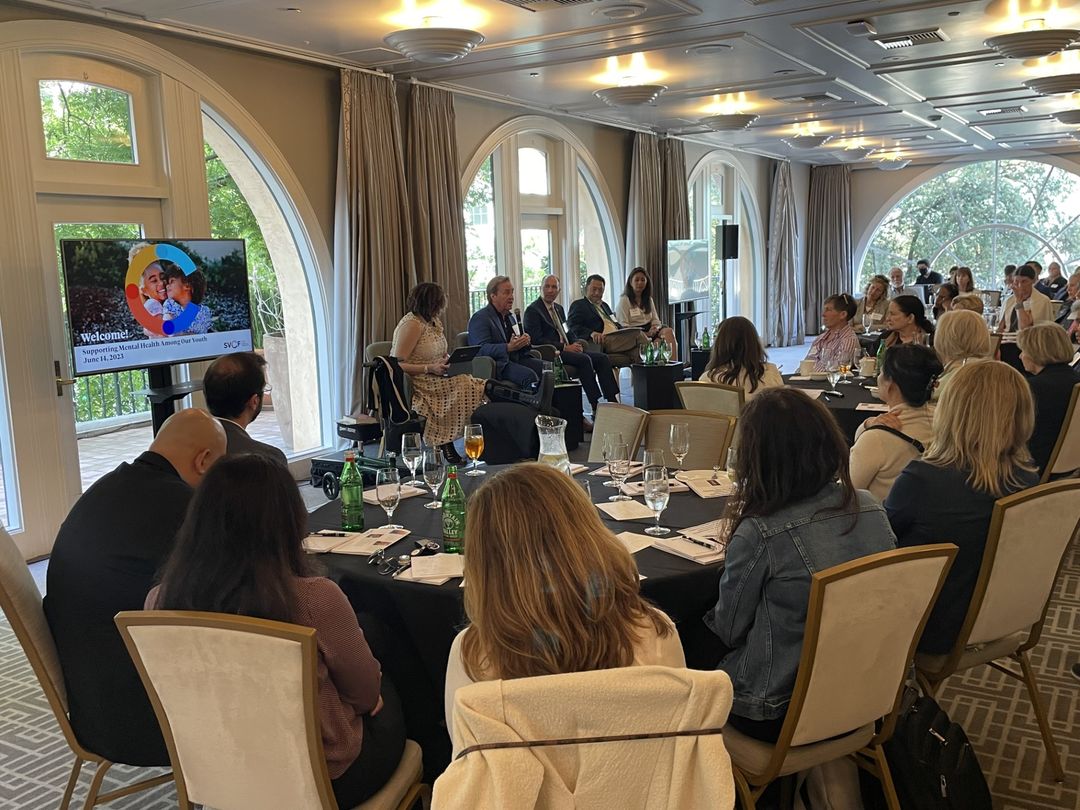
In June 2023, SVCF hosted a donor event at the El Prado Hotel in Palo Alto to raise the flag about the state of mental health among children and youth against the backdrop of a post-pandemic world. Moderated by Silicon Valley Community Foundation President and CEO Nicole Taylor, the conversation featured Momentum for Health CEO David Mineta, CASSY Executive Director Marico Sayoc, One Mind President Brandon Staglin, and Common Sense Media Founder and CEO Jim Steyer.
Taylor spoke one-on-one with each speaker about their respective organizations’ work in addressing youth mental health. The powerful conversations, which were punctuated with deeply personal stories from the speakers, both laid bare the mental health crisis facing our youth and shined light on the organizations working on solutions. The following were prominent themes from the conversation:
The pandemic’s effects continue to strain the mental health system
Even before the pandemic, county reports showed that mental health among youth was worsening, according to Mineta. The pandemic took away in-person schooling, depriving young individuals of extracurricular activities and vital social interactions they need for support, connection and personal growth.
Sayoc described the landscape of youth mental health through the perspective of CASSY’s on-site counseling at schools. When the pandemic shut down schools, many students lost access to their only lifeline of support.
The abrupt disruption of daily routines, social isolation and increased uncertainty continue to take a toll on young individuals, and the increased demand for mental health services are straining an already burdened system.
“We can only do so much with a workforce shortage,” said Sayoc, explaining that CASSY is exploring ways to maximize peer-to-peer support.
Staglin, who has a lived experience with schizophrenia, also advocated strongly for peer support, crediting his personal network for keeping him strong during his most challenging moments with schizophrenia.
Adults need to be paying more attention
Adults play vital roles in destigmatizing mental health challenges and supporting youth, but may also need support when it comes to understanding and recognizing signs and symptoms.
Mineta highlighted that the scale of the mental health crisis touches nearly every family – including his own. “The anxiety and depression were news to me, and I’m in the field,” he said, referring to his own personal experience.
“We need to teach teachers, educators and parents how to talk about these issues with young people,” Steyer said, “The youth voice matters so much – we need to talk to young people.” Common Sense Media’s extensive research provides parents, educators, health organizations, and policymakers with reliable, independent data and information to help them navigate the digital world with their kids.
Increasing mental health literacy is another important strategy. One way is through Mental Health First Aid, a program developed by the National Council for Mental Wellbeing and facilitated by Momentum for Health. It provides trainings to support early detection and intervention of mental health crises among adolescents, young adults and adults.
Overall, adults need to be attentive and proactive in supporting youth mental health and ensuring that young individuals have the resources and support they need to work through these challenges.
Philanthropy can play a vital role
Every speaker underscored the role and value that the philanthropy sector and donors have in supporting the different facets of the youth mental health crisis.
One Mind, for example, invests in opportunities through its Accelerator program, which funds early-stage startups working on real-world solutions to improve the lives of people facing mental health conditions. One Mind has the bandwidth and capacity to invest in these higher risk opportunities that often yield high rewards. Staglin says philanthropy can leverage these opportunities.
Direct service organizations have the potential to change countless lives even with smaller investments. Sayoc illustrated that just $500 goes far at her organization, enabling one CASSY therapist to provide five students with counseling and therapy services in one day.
Thanks to a public grant, Momentum for Health has expanded its Mental Health First Aid training for other nonprofits and community members in Santa Clara County – meaning more people will be equipped to identify, understand and respond to signs of mental illness. With additional funding, the program could expand beyond Santa Clara County.
Common Sense Media, which leads legislative advocacy to regulate social media for a safer, healthier digital life for youth, needs funding to support “people who are willing to stand up to the industry,” according to Steyer.
“When we have a bill in Sacramento, [those companies] will spend 100 to 150 million dollars lobbying against our bills,” said Steyer. “It’s us and a few other advocates going up against the above – and we can win.”
Forming new partnerships
The speakers even learned from one another, and have plans to collaborate beyond the event – a testament to SVCF’s power of building relationships and convening the right players to tackle challenging community issues.
CASSY and Momentum for Health are planning to work together to provide Mental Health First Aid training for CASSY parents. CASSY is also brainstorming with Common Sense Media about implementing some of Common Sense Media’s policies on a smaller scale.
One Mind can refer professionals within its statewide early psychosis care network to Momentum for Health and CASSY, while offering opportunities to support the mental wellbeing of the clinicians and providers. One Mind also prioritizes mental health promotion in the media, making it a natural partner for Common Sense Media, says Staglin.
“These partnerships ultimately help our school communities and support our students’ wellbeing,” said Sayoc.
Additional resources
Momentum for Health Welcomes Michael Scates as Our New President & CEO - Read More